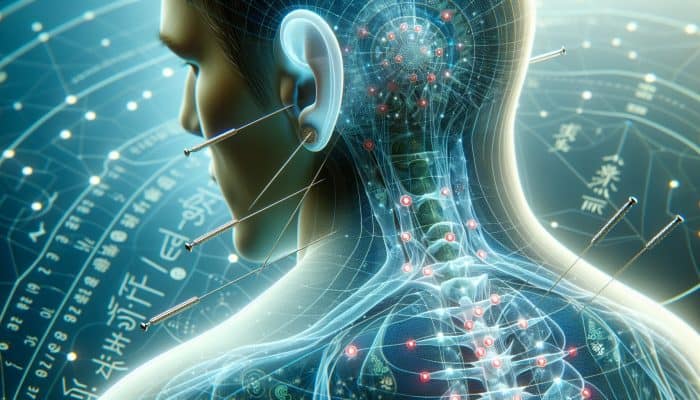Exploring the Benefits of Acupuncture in the UK
What Exactly is Acupuncture?

Acupuncture for Appetite Regulation: Acupuncture is an ancient therapeutic technique originating from traditional Chinese medicine, where fine needles are delicately inserted into specific points of the body to restore equilibrium to the body's energy, known as “Qi.” In the UK, acupuncture has gained traction as a holistic remedy for various health issues, particularly in regulating appetite and digestion. Many practitioners promote acupuncture as a natural and effective solution for individuals seeking to manage their weight or curb cravings, appealing to those looking for alternatives to conventional treatments.
Some of the common applications of acupuncture in the UK include:
- Pain management
- Stress relief
- Digestive disorders
- Insomnia
- Menstrual issues
- Allergy relief
- Appetite control
The gentle and non-invasive nature of acupuncture renders it accessible to a diverse range of individuals, with many seeking this therapy for its comprehensive benefits to both physical and mental health.
What is the Historical Context of Acupuncture in the UK?
The introduction of acupuncture in the UK can be traced back to the 1970s, when practitioners from China began sharing this ancient practice with British audiences. Initially met with scepticism, the proven effectiveness of acupuncture in treating various health concerns, including appetite regulation, gradually won over many sceptics. Over the years, acupuncture has developed into a well-respected therapeutic option, recognised by both alternative and mainstream medical communities.
Key historical milestones include:
- 1970s: Introduction of acupuncture to the UK
- 1980s: Formation of professional organisations for acupuncture practitioners
- 1995: Establishment of the British Acupuncture Council (BAcC)
- 2000s: Increasing acknowledgement within the NHS by healthcare professionals
- 2010s: Rising public awareness and acceptance of the benefits of acupuncture
Today, acupuncture is widely practised and respected, with numerous clinics and practitioners offering specialised treatments that emphasise appetite regulation among various health concerns.
How is Acupuncture Regulated in the UK?
In the UK, the practice of acupuncture operates under stringent regulatory frameworks designed to ensure high standards of training, safety, and practice. The British Acupuncture Council (BAcC) serves as the primary regulatory body, overseeing practitioners and establishing criteria for professional conduct. This regulation plays a crucial role in building trust and ensuring that patients receive safe and effective treatments for conditions such as appetite regulation.
Other regulatory bodies involved in acupuncture in the UK include:
- British Acupuncture Council (BAcC)
- Acupuncture Association of Chartered Physiotherapists (AACP)
- British Medical Acupuncture Society (BMAS)
- International Federation of Acupuncture and Moxibustion Societies (IFAM)
These organisations strive to uphold high standards in training, ethics, and practice, ensuring that patients can confidently seek acupuncture as a viable option for managing their appetite and enhancing their overall health.
How Does Acupuncture Effectively Aid in Appetite Control?

Understanding the Mechanisms Behind Appetite Regulation
Acupuncture plays a significant role in influencing the body's appetite through well-documented mechanisms that involve stimulating specific acupuncture points, which in turn promote the release of hormones that regulate hunger and appetite. By interacting with the hypothalamus—an essential brain region involved in controlling hunger and satiety—acupuncture can effectively help individuals manage their cravings and reduce feelings of hunger. This method is particularly appealing to those who wish to manage their weight without resorting to invasive procedures.
Key acupuncture points associated with appetite control include:
- ST36 (Zusanli)
- SP6 (Sanyinjiao)
- HT7 (Shenmen)
- LI4 (Hegu)
- PC6 (Neiguan)
- LV3 (Taichong)
By stimulating these pivotal points, practitioners aim to promote balance within the body, leading to a decreased appetite and improved metabolic function. This makes acupuncture an attractive option for those grappling with weight management challenges.
What Are the Immediate Effects of Acupuncture on Appetite?
Patients frequently experience immediate benefits following an acupuncture session, particularly in terms of hunger reduction and minimised cravings. Many individuals report encountering a profound sense of calm and relaxation, which can significantly impact their eating habits. This immediate response is one of the reasons acupuncture is increasingly favoured by those seeking effective ways to manage their appetite.
During the treatment, the release of endorphins and other neurotransmitters can lead to a reduction in stress-related eating, enabling clients to gain better control over their cravings. This initial relief can pave the way for healthier eating habits and contribute to long-term appetite regulation. Numerous practitioners observe that the enhanced sense of well-being induced by acupuncture strengthens patients' willpower, making it easier to resist unhealthy food choices.
What Are the Long-Term Benefits of Acupuncture for Appetite Management?

Regularly incorporating acupuncture into one’s wellness routine can yield significant long-term advantages for appetite control. Many patients discover that, with consistent treatment, their cravings diminish and their overall relationship with food improves markedly. This sustained impact can help achieve effective weight management and contribute positively to overall health.
Notably, individuals who engage in regular acupuncture often report not only a reduction in appetite but also enhanced mood and increased energy levels. These emotional benefits can motivate a more active lifestyle and promote healthier dietary choices. Over time, the combination of decreased cravings and improved well-being supports a holistic approach to weight management, making acupuncture a powerful ally in achieving lasting results.
How Can Acupuncture Be Integrated into a Holistic Weight Loss Plan?
Acupuncture can serve as a crucial component of a well-rounded weight loss strategy. By effectively managing appetite control, individuals can more successfully adhere to their dietary goals. For optimal outcomes, practitioners often recommend combining acupuncture with a balanced diet and regular exercise.
Begin by consulting a qualified acupuncturist who can create a personalised treatment plan tailored to your specific objectives. Regular sessions, typically scheduled on a weekly or bi-weekly basis, can help reinforce appetite control. Additionally, practitioners may suggest integrating acupuncture with mindfulness practices or stress management techniques, as these can further enhance the treatment's efficacy.
For those looking to achieve significant weight loss, combining acupuncture with a structured plan that prioritises healthy eating and physical activity creates a synergistic effect that fosters long-term success.
What Are the Safety Measures and Potential Side Effects of Acupuncture for Appetite Control?
Acupuncture is widely regarded as a safe therapeutic option for appetite control, with minimal side effects when administered by a qualified practitioner. Most patients experience few complications; however, some may encounter mild bruising or soreness at the needle insertion sites. These side effects are generally transient and resolve promptly.
To ensure safety, it is crucial to receive treatment from a licensed acupuncturist who adheres to the regulations established by organisations such as the British Acupuncture Council. Before initiating treatment, individuals should discuss any health concerns or pre-existing conditions with their practitioner to receive the most suitable care.
By following safety guidelines and consulting qualified professionals, patients can confidently explore acupuncture as a means of managing their appetite and enhancing their overall health.
Insights from Experts on Acupuncture for Appetite Regulation
What Are Some Real-World Examples of Acupuncture Success Stories?
In the UK, numerous practitioners have documented inspiring success stories of patients who have significantly benefited from acupuncture in managing their appetite. For instance, one case involved a middle-aged woman who struggled with emotional eating, resulting in notable weight gain. After undergoing a series of acupuncture sessions focused on appetite regulation, she reported a significant decrease in cravings and a newfound ability to control her eating habits. Within a few months, she successfully lost weight and felt more in tune with her body’s natural hunger signals.
Another example features a young man seeking acupuncture to support his weight loss journey. After incorporating regular sessions into his routine, he found that his cravings for sugary snacks diminished remarkably. The acupuncture treatments not only aided in appetite control but also provided him with a sense of calm, making it easier for him to commit to his exercise regimen. Such real-world examples highlight the efficacy of acupuncture as a valuable complementary therapy for appetite management.
What Actionable Steps Can Individuals Take for Effective Acupuncture Treatment?
For those interested in benefiting from acupuncture for appetite regulation, taking actionable steps is crucial. Start by locating a qualified acupuncturist who is a member of recognised professional organisations such as the British Acupuncture Council. A thorough consultation is vital, allowing patients to discuss their appetite issues and health objectives openly.
Once a treatment plan is established, it is important to adhere to the recommended schedule of acupuncture sessions. Practitioners typically advise attending sessions regularly, especially in the early stages, to build momentum in appetite control. Maintaining open communication with the acupuncturist allows for adjustments to the treatment plan based on individual progress and feedback.
To maximise the benefits of acupuncture, consider integrating it with other lifestyle factors, such as a balanced diet and regular exercise, which together support effective appetite management.
What Expert Analysis Exists Regarding the Efficacy of Acupuncture?
Experts in the field of acupuncture generally agree that it offers an effective complementary therapy for regulating appetite. A wealth of clinical evidence and patient testimonials underscores its potential to help individuals manage their eating behaviours. Many practitioners emphasise that acupuncture not only addresses the physical sensations of hunger but also contributes to emotional well-being, which plays a key role in appetite control.
As a holistic practice, acupuncture considers the body as a whole, thereby promoting balance within various systems. This integrative approach is particularly advantageous for individuals who may struggle with emotional eating or stress-related appetite fluctuations. Through a combination of hormonal regulation and emotional support, acupuncture demonstrates its value in managing appetite.
How Does Acupuncture Contribute to a Holistic Weight Management Strategy?
Acupuncture integrates seamlessly into a holistic weight management plan, where its influence extends beyond mere appetite regulation. It enhances overall health by addressing both physical and emotional factors that contribute to weight gain. By alleviating stress and improving mood, acupuncture encourages healthier lifestyle choices and habits.
Incorporating acupuncture into a broader weight management strategy can lead to enhanced effectiveness. As patients work towards improving their diet and increasing their physical activity, acupuncture serves as a supportive tool that helps sustain motivation and resilience throughout their journey. Regular sessions help to reinforce the body’s natural rhythms, facilitating the maintenance of healthy eating patterns and physical activity levels over the long term.
The synergy between acupuncture and other health practices creates a comprehensive approach to weight management, ultimately fostering a sustainable environment for achieving lasting results.
What Are the Key Advantages of Acupuncture for Appetite Management?
How Does Acupuncture Reduce Hunger and Cravings?
One of the most celebrated advantages of acupuncture in terms of appetite control is its capacity to diminish both the frequency and intensity of hunger pangs and cravings. By targeting specific acupuncture points, practitioners can effectively modulate hunger signals, leading to improved appetite regulation. This reduction in cravings can be particularly beneficial for those grappling with emotional eating or unhealthy snacking habits.
Patients frequently report experiencing a newfound ability to manage their food intake without the overwhelming urge to snack between meals. This transformation contributes not only to more effective weight management but also to fostering a healthier relationship with food. The strength of acupuncture lies in its gentle, holistic approach to addressing the underlying causes of excessive hunger and cravings.
What Role Does Acupuncture Play in Enhancing Metabolic Function?
Acupuncture significantly enhances metabolic function, a key factor in effective weight management. By stimulating specific points related to digestive health, acupuncture promotes better nutrient absorption and metabolic processes. This enhancement can result in more efficient calorie burning, supporting weight loss efforts and overall well-being.
Regular acupuncture treatments help balance hormones associated with appetite and metabolism, thereby supporting the body’s natural ability to regulate weight. As patients experience improved metabolic function, they may notice an increase in their energy levels, making it easier to incorporate physical activity into their daily routines. The synergy between acupuncture and metabolism underscores the interconnectedness of bodily systems in achieving lasting health benefits.
How Does Acupuncture Improve Overall Well-being?
Beyond its specific advantages for appetite regulation, acupuncture is widely recognised for its ability to enhance overall well-being. Many patients report experiencing an elevated mood and increased energy levels following treatments, which indirectly supports their efforts in regulating appetite. This emotional uplift plays a vital role in maintaining motivation for healthy eating and regular exercise.
As acupuncture alleviates stress and anxiety, patients often find themselves more resilient against emotional triggers that lead to overeating. This holistic effect on mental health contributes to a balanced approach to weight management, as individuals learn to make healthier choices that align with their overall well-being. The positive impact on overall health and emotional state can lead to sustainable lifestyle changes, promoting longevity through the benefits of acupuncture for appetite control.
What Acupuncture Techniques Are Effective for Appetite Management?
How Does Ear Acupuncture Assist in Appetite Control?
Ear acupuncture, also known as auricular therapy, targets specific points on the ear believed to correspond with various bodily functions, including appetite control. This technique has gained popularity in the UK as a non-invasive method to help manage cravings and foster a balanced relationship with food.
Practitioners often focus on points such as the hunger point and the endocrine point to regulate appetite and hormone levels. By stimulating these regions, patients can experience a reduction in cravings and an enhanced sense of fullness. The convenience of ear acupuncture—especially with the option for self-administered seeds or beads—makes it an attractive choice for ongoing appetite management outside of regular treatment sessions.
Many patients find that ear acupuncture complements their overall treatment plan, providing a convenient means to reinforce appetite control throughout their daily lives, thereby enhancing the effectiveness of their weight loss strategies.
What Body Acupuncture Points Are Used for Appetite Regulation?
In addition to ear acupuncture, body acupuncture utilises a range of specific points to regulate appetite effectively. Notable points include ST36 (Zusanli) and SP6 (Sanyinjiao), both of which are traditionally used to promote digestive health and balance energy within the body. By inserting needles into these points, practitioners aim to stimulate the digestive system, enhance metabolism, and subsequently control appetite.
Other relevant points may include those located along the stomach and spleen meridians, which are directly associated with digestion and appetite regulation. The selection of points can vary based on individual needs, making it essential for patients to consult skilled practitioners who can tailor treatments to their specific situations.
As patients engage with these body acupuncture techniques, they often report not only reduced cravings but also improved digestive health and energy levels, reinforcing the holistic nature of acupuncture in managing appetite.
What Are the Best Practices for Maximising Acupuncture Sessions?
To maximise the benefits of acupuncture for appetite management, adhering to best practices during sessions is crucial. Patients should aim to attend regular sessions, ideally following a treatment plan established by their acupuncturist. This consistency allows for ongoing reinforcement of appetite control and supports the body’s natural healing processes.
Effective communication is vital for the success of acupuncture treatment. During each session, patients should openly discuss their experiences, including any changes in appetite, cravings, or overall wellness. This dialogue enables practitioners to adjust treatment plans as necessary, ensuring that patients receive the most tailored care possible.
Additionally, integrating acupuncture sessions with other healthy lifestyle choices—such as a balanced diet and regular exercise—can enhance the overall effectiveness of the treatment. This holistic approach fosters a supportive environment that promotes lasting appetite regulation and effective weight management.
How Can Acupuncture Be Combined with Dietary Changes for Optimal Results?
To achieve optimal results in appetite control, it is beneficial to combine acupuncture with thoughtful dietary adjustments. Integrating acupuncture with a balanced diet can significantly enhance the body’s ability to manage cravings and promote a healthier relationship with food. Practitioners often recommend that patients focus on improving their nutritional habits while receiving acupuncture treatments.
This might involve prioritising whole foods, reducing processed sugars, and ensuring adequate hydration—factors that all contribute to enhanced appetite regulation. As patients begin to experience reduced cravings due to acupuncture, they may find it easier to make healthier food choices that align with their wellness goals.
The synergistic effect between acupuncture and dietary adjustments creates a powerful framework for effective appetite management. Together, they foster long-term health benefits that can lead to sustainable weight loss and improved overall well-being.
What Does Research Say About the Benefits of Acupuncture for Appetite Regulation?
What Do Clinical Studies Reveal About Acupuncture and Appetite Control?
A growing body of clinical studies in the UK supports the effectiveness of acupuncture in reducing appetite and aiding weight loss efforts. Researchers have observed that patients undergoing acupuncture treatments often report significant decreases in hunger levels and improved control over food intake. These findings align with anecdotal evidence from practitioners throughout the country.
In particular, studies have focused on the physiological effects of acupuncture on hunger hormones, demonstrating its potential to balance ghrelin and leptin levels—two key hormones involved in regulating appetite. This scientific backing lends credibility to acupuncture as a viable option for those struggling with appetite control.
As research continues to expand, acupuncture’s position within the realm of appetite regulation becomes increasingly validated, offering hope to those seeking holistic approaches to weight management.
What Evidence Supports Acupuncture's Efficacy?
The evidence suggests that acupuncture can be a valuable tool for regulating appetite, supported by both clinical research and patient testimonials. Numerous studies have highlighted the positive outcomes associated with acupuncture treatments, particularly in terms of reduced cravings and improved appetite control. Patients often report significant benefits, including heightened awareness of their hunger cues and better emotional regulation surrounding food.
Experts agree that acupuncture’s efficacy is rooted in its holistic approach; by addressing not only the physical aspects of appetite but also the emotional and psychological factors, it offers a comprehensive solution. The consistently positive experiences reported by patients underscore the growing recognition of acupuncture as a legitimate complementary therapy for appetite management.
What Patient Outcomes and Testimonials Exist Regarding Acupuncture?
Numerous patients in the UK share their success stories following acupuncture treatment for appetite regulation. Many report experiencing profound changes in their relationship with food, noting a marked decrease in cravings and a newfound ability to choose healthier options consistently. For example, a patient who had long struggled with emotional eating described how acupuncture helped her reconnect with her body's natural signals, allowing her to eat mindfully for the first time in years.
Such testimonials illustrate the significant impact acupuncture can have on both appetite control and overall health. As patients continue to share their positive outcomes, acupuncture is increasingly embraced by those looking for natural solutions to manage their appetite and support weight loss journeys.
How Does Acupuncture Work in Appetite Control Mechanisms?
Acupuncture influences appetite by targeting specific points that modulate hunger hormones and neural pathways involved in appetite regulation. This stimulation can lead to the release of neurotransmitters, such as endorphins, which promote a sense of well-being and reduce stress-related eating behaviours. Furthermore, acupuncture can positively affect digestive health, enhancing the body’s ability to process nutrients and energy efficiently.
By addressing these fundamental aspects of appetite control, acupuncture provides a holistic approach that not only tackles the symptoms of overeating but also works to restore balance within the body. This multifaceted mechanism positions acupuncture as a powerful ally for those seeking to manage their appetite and achieve sustainable weight loss.
How Can Acupuncture Be Integrated into a Healthy Lifestyle?
What Are Effective Strategies for Combining Acupuncture with Diet and Exercise?
Integrating acupuncture into a healthy lifestyle is essential for effective appetite control and weight management. By combining acupuncture treatments with a balanced diet and regular exercise, patients can amplify the effects of each component, leading to improved outcomes. This holistic approach creates a supportive environment that fosters lasting changes in appetite regulation and overall health.
Acupuncture can help reduce cravings and enhance motivation, making it easier to adhere to a healthy diet and exercise regimen. Regular physical activity, when combined with mindful eating practices, enhances the benefits of acupuncture, enabling patients to lead a more balanced and fulfilling lifestyle. Many patients find that this integrated approach fosters a sense of empowerment, encouraging them to take charge of their health proactively and in a positive manner.
As they begin to experience the combined benefits of acupuncture and lifestyle changes, patients frequently report enhanced mood, increased energy, and greater control over their eating behaviours, culminating in sustainable weight management.
What Lifestyle Changes Are Supportive of Acupuncture Treatments?
To maximise the benefits of acupuncture, incorporating supportive lifestyle changes is vital. Patients should consider adopting a balanced diet rich in whole foods, engaging in regular physical activity, and practising stress management techniques such as mindfulness or yoga. These lifestyle adjustments can enhance the overall efficacy of acupuncture treatments, leading to lasting improvements in appetite control and health.
Moreover, maintaining a positive mindset and establishing realistic goals can significantly impact the success of both acupuncture and lifestyle changes. Patients who concentrate on gradual progress rather than seeking perfection often find it easier to sustain their efforts and achieve their long-term health objectives.
By embracing these lifestyle changes, individuals can create a holistic support system that reinforces the benefits of acupuncture, fostering a more profound and lasting impact on appetite regulation and overall well-being.
What Are Effective Long-Term Strategies for Appetite Management?
Successful appetite control requires a commitment to long-term strategies that encompass ongoing acupuncture sessions, lifestyle adjustments, and consistent check-ins with healthcare providers. Establishing a routine that includes regular acupuncture appointments can help reinforce appetite regulation and support healthy eating behaviours over time.
Additionally, patients should remain proactive in evaluating their progress and making necessary adjustments to their diets and exercise routines. Regularly assessing their hunger signals and emotional responses to food can provide valuable insights into their ongoing relationship with food. Open communication with healthcare providers enables the development of tailored strategies that meet individual needs and goals.
Long-term appetite management is a continuous process that benefits from a comprehensive approach, integrating acupuncture’s holistic principles with lifestyle factors to cultivate a healthier relationship with food and a more balanced life.
How to Find the Right Acupuncturist in the UK?
What Qualifications Should You Look for in an Acupuncturist?
When searching for an acupuncturist in the UK, it’s essential to seek qualified practitioners who are members of recognised professional bodies, such as the British Acupuncture Council (BAcC). Membership in such organisations ensures that acupuncturists adhere to high standards of training, ethics, and practice.
Furthermore, consider practitioners who possess specialised training in appetite regulation and weight management, as they will be better equipped to address your specific needs. Reading reviews, seeking recommendations, and scheduling initial consultations can further help ensure you choose a practitioner who aligns with your goals and values.
By prioritising these qualifications, patients can find an acupuncturist who provides safe, effective, and tailored treatment for appetite management, fostering a positive experience that supports their overall health journey.
What Can You Expect During Your First Acupuncture Session?
During your first acupuncture session, expect a comprehensive consultation where the practitioner will gather a detailed medical history and discuss your appetite issues and health goals. This initial assessment is crucial for creating a personalised treatment plan tailored to your unique needs.
The practitioner will explain the acupuncture process, addressing any queries or concerns you may have. After this consultation, you will receive your first acupuncture treatment, which typically lasts between 30 and 60 minutes. Throughout the session, practitioners will strive to create a relaxed and comfortable environment, enabling you to unwind as the treatment takes effect.
Following the session, practitioners may provide recommendations for ongoing care, including the frequency of subsequent sessions and complementary lifestyle adjustments to optimise the benefits of acupuncture for appetite control.
How Can You Evaluate the Effectiveness of Acupuncture?
Evaluating the effectiveness of acupuncture for appetite regulation involves tracking changes in appetite levels, weight, and overall well-being. Keeping a journal to note any shifts in cravings or eating behaviours post-sessions can provide valuable insights into the treatment's impact.
Additionally, patients should schedule regular check-ins with their acupuncturist to discuss progress and any challenges they encounter during the treatment process. This open dialogue facilitates adjustments to the treatment plan as needed, ensuring that the acupuncture sessions remain aligned with the patient’s goals.
Over time, many individuals experience significant improvements in appetite control and overall health, serving as a clear indicator of the effectiveness of acupuncture in their journey, making it an empowering experience.
Frequently Asked Questions About Acupuncture
What is acupuncture?
Acupuncture is a traditional Chinese medicine practice that involves the insertion of thin needles into specific points on the body to balance the flow of energy, ultimately promoting physical and mental well-being.
How does acupuncture help with appetite regulation?
Acupuncture regulates appetite by stimulating specific points that affect hunger hormones and neural pathways, resulting in reduced cravings and improved control over eating behaviours.
Is acupuncture safe for appetite control?
Yes, acupuncture is generally safe when performed by qualified practitioners. Mild side effects, such as bruising or soreness, may occur but are usually temporary.
How long does it take to see results from acupuncture?
Many patients experience immediate effects after the first session, while sustained results often develop over several weeks of regular treatments.
Can acupuncture be combined with diet and exercise?
Absolutely! Combining acupuncture with a balanced diet and regular physical activity enhances the effectiveness of appetite regulation and supports overall weight management.
What should I expect during my first acupuncture session?
Your first session will include a comprehensive consultation, during which the practitioner will discuss your health history and goals, followed by an initial treatment tailored to your specific needs.
How can I find a qualified acupuncturist in the UK?
Look for acupuncturists who are members of recognised bodies, such as the British Acupuncture Council, to ensure they meet high standards of training and practice.
Are there any side effects of acupuncture?
Potential side effects include mild bruising or soreness at needle sites. These are generally minor and resolve quickly after treatment.
How many acupuncture sessions are needed for appetite management?
The number of sessions varies per individual, but regular treatments are typically recommended on a weekly or bi-weekly basis to reinforce appetite control.
Can acupuncture help with emotional eating?
Yes, acupuncture can help address emotional eating by reducing stress and anxiety, leading to better control over cravings and healthier eating habits.



